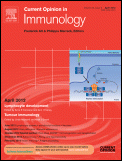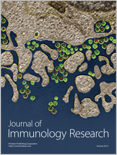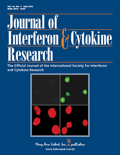
CURRENT OPINION IN IMMUNOLOGY
Scope & Guideline
Shaping the Future of Immune Science
Introduction
Aims and Scopes
- Immune Response Mechanisms:
The journal extensively covers the mechanisms underlying immune responses, including the roles of different immune cells, signaling pathways, and the molecular interactions that govern these processes. - Clinical Immunology and Therapeutics:
A significant portion of the content is dedicated to clinical applications of immunology, particularly in the context of vaccines, cancer immunotherapy, and autoimmune diseases, highlighting translational research. - Microbiome and Immune Interactions:
Recent publications indicate a growing interest in the relationship between the microbiome and immune function, exploring how microbial communities influence host immune responses and contribute to health and disease. - Innovative Research Techniques:
The journal features papers that discuss novel methodologies and technologies in immunology research, such as single-cell transcriptomics and advanced imaging techniques, underscoring the importance of innovation in studying immune systems. - Interferon Biology:
There is a consistent focus on the role of interferons in both innate and adaptive immunity, investigating their diverse functions and regulatory mechanisms across various contexts, including viral infections and chronic diseases.
Trending and Emerging
- T Follicular Helper Cell Dynamics:
Papers discussing T follicular helper cells have surged, indicating a growing recognition of their critical role in orchestrating adaptive immune responses, particularly in relation to allergies and vaccine responses. - Interferon Signaling Pathways:
There is an increasing emphasis on the diverse roles of interferons in both innate and adaptive immunity, particularly in the context of viral infections and cancer, showcasing their importance in therapeutic strategies. - Immunometabolism:
Research focusing on the metabolic pathways that influence immune cell function is on the rise, highlighting the interplay between metabolism and immunity, which is crucial for understanding immune responses in various diseases. - Microbiome-Immune Interactions:
The exploration of how microbiota influence immune development and function is becoming a prominent theme, reflecting a broader interest in host-microbe interactions and their implications for health. - Cellular Senescence and Immunity:
Emerging studies on cellular senescence and its impact on immune function indicate a growing interest in how aging and chronic inflammation affect immune responses, particularly in the context of cancer and autoimmune diseases.
Declining or Waning
- Traditional Vaccine Approaches:
There seems to be a diminishing focus on conventional vaccine strategies as newer technologies, such as mRNA vaccines, gain prominence, suggesting a shift towards innovative vaccine platforms. - Basic Immunological Principles:
Basic concepts of immunology, while still essential, are receiving less attention compared to applied research and specific immune responses, indicating a trend towards more specialized topics. - Static Models of Immune Function:
Research employing static or less dynamic models of immune function is becoming less prevalent as the field moves towards understanding the complexities of immune interactions in real-time and in vivo contexts.
Similar Journals

HUMAN IMMUNOLOGY
Illuminating the Pathways of Human ImmunologyHUMAN IMMUNOLOGY, published by Elsevier Science Inc, serves as a critical platform for disseminating research in the fields of immunology and allergy, as well as various aspects of miscellaneous medicine since its inception in 1980. With an ISSN of 0198-8859 and E-ISSN 1879-1166, this journal is pivotal for researchers and practitioners looking to advance their understanding of human immune responses and related conditions. The journal currently holds a respectable position within its field, as highlighted by its 2023 Scopus ranks—#114/233 in Immunology and Allergy and #132/236 in Immunology and Microbiology. Moreover, it maintains a Q2 quartile ranking in both Immunology and Allergy and miscellaneous Medicine, underscoring its influence and reach within the scientific community. Although it does not currently offer Open Access options, HUMAN IMMUNOLOGY remains dedicated to providing valuable insights and fostering academic discourse within its discipline, characterized by a rigorous peer-review process and a focus on innovative research trajectories.

INTERNATIONAL JOURNAL OF IMMUNOPATHOLOGY AND PHARMACOLOGY
Innovative Research Driving the Future of Immune Health.Welcome to the International Journal of Immunopathology and Pharmacology, a premier publication dedicated to advancing the fields of immunology and pharmacology. Published by SAGE Publications Inc., this Open Access journal has been a vital resource since its inception in 1989, providing an expansive platform for innovative research and comprehensive reviews until 2024. With a strong focus on the mechanisms of immune responses and therapeutic developments, our journal stands out with a 2023 impact factor reflected in its Q3 ranking in Immunology and Allergy, and a Q2 ranking in Pharmacology. The journal's Scopus rankings highlight its significance, ranking #174 in Pharmacology, #141 in Medicine, and #156 in Immunology, all affirming its role in contributing to the broader scientific community. Through rigorous peer review and a commitment to high-quality research, the International Journal of Immunopathology and Pharmacology continues to be an essential resource for scientists, healthcare professionals, and students striving to enhance their knowledge and understanding in these critical fields.

INTERNATIONAL IMMUNOLOGY
Transforming Knowledge into Therapeutic Solutions in Immunology.INTERNATIONAL IMMUNOLOGY, published by OXFORD UNIV PRESS, stands out as a premier journal in the field of immunology, providing a vital platform for disseminating groundbreaking research and innovative developments within the discipline. With an impressive Q1 ranking in Immunology and Allergy, as well as in Medicine (miscellaneous), it consistently showcases high-impact studies that contribute to the advancement of immunological knowledge. The journal spans over three decades, from its inception in 1989 to its ongoing contributions as of 2024, thus solidifying its reputation in the scientific community. Researchers, professionals, and students will find valuable articles that delve into the complexities of immune responses, therapeutic interventions, and emerging immunological paradigms, ensuring INTERNATIONAL IMMUNOLOGY remains at the forefront of knowledge in the life sciences.

Journal of Immunology Research
Unlocking Immune Mechanisms: Where Discovery Meets AccessibilityJournal of Immunology Research, published by HINDAWI LTD, stands as a pivotal open-access journal in the realm of immunology, with a particular emphasis on advancing knowledge in both fundamental and applied aspects of the field. Since its inception in 1990, the journal has committed to the dissemination of high-quality research, earning a respectable impact factor that reflects its significance. Based in Egypt, it provides a platform for researchers from around the world, showcasing innovative studies and reviews that contribute to the understanding of immune system mechanisms. Its 2023 rankings place it in the Q2 category for Immunology and Allergy, and Q1 in the broader category of Medicine (miscellaneous), indicating a strong reputation among its peers. Through its open-access model, the journal promotes wide accessibility of cutting-edge research, catering to researchers, professionals, and students alike. With ambitions that converge through 2024, the Journal of Immunology Research continues to be an essential resource for those seeking to explore the forefront of immunological science.

VIRAL IMMUNOLOGY
Unraveling the complexities of viral interactions with immune systems.Viral Immunology, published by Mary Ann Liebert, Inc, stands as a prominent journal dedicated to advancing the understanding of the interplay between viral infections and host immune responses. With a strong focus on immunology, molecular medicine, and virology, the journal provides a platform for the dissemination of high-quality research findings and innovative methodologies that could shape the future of these critical fields. Although it currently holds a Q3 rating across its relevant categories and a respectable ranking within the Scopus database, Viral Immunology continues to strive for excellence with a commitment to publishing influential research that informs both academic and clinical practices. The journal accepts submissions in various formats—original research, reviews, and commentaries—catering to a diverse readership that includes researchers, professionals, and students engaged in the biological and medical sciences. Readers can anticipate insightful articles that address urgent challenges in immunological responses to viral infections, paving the way for new therapeutic strategies and public health initiatives.

JOURNAL OF INTERFERON AND CYTOKINE RESEARCH
Exploring Cytokine Functions for Health BreakthroughsJOURNAL OF INTERFERON AND CYTOKINE RESEARCH, published by Mary Ann Liebert, Inc, stands out as a pivotal resource in the fields of immunology, virology, and cell biology, providing comprehensive insights into cytokine functions and their roles in immune responses. With ISSN 1079-9907 and E-ISSN 1557-7465, the journal aims to disseminate innovative research that advances our understanding of interferon and cytokine biology, a crucial aspect for developing therapeutic strategies against various diseases. Covering a broad scope of research from 1995 to 2024, it boasts a respectable impact factor within its category quartiles, ranking Q2 in Medicine (miscellaneous) and Q3 in the domains of Cell Biology, Immunology, and Virology as of 2023. While it does not provide open access options, the journal remains essential for academics, researchers, and professionals dedicated to exploring the complexities of immune signaling pathways and their implications for health and disease. The journal’s consistent contribution to scientific discourse underscores its importance in elevating query-driven studies to foster advancements in biomedical science.

Welcome to Immuno, a pioneering open-access journal published by MDPI that serves as a key platform for the dissemination of innovative research in the fields of immunology, biochemistry, and genetics. Established in 2021, this journal has rapidly established itself within the academic community, currently ranking in the 53rd percentile in Medicine (miscellaneous) and 50th percentile in Biochemistry, Genetics, and Molecular Biology according to Scopus metrics. With a commitment to advancing our understanding of immune mechanisms and their applications in health and disease, Immuno is dedicated to publishing high-quality peer-reviewed articles that contribute valuable insights to both researchers and practitioners. Positioned in the heart of Switzerland, its global accessibility and diverse editorial board are a testament to its aim to promote knowledge exchange among scientists, practitioners, and students alike. Explore the latest discoveries and advancements in immunological research through Immuno, where your contributions help shape the future of this critical area of study.

Science Immunology
Exploring the Depths of Immune ResponsesScience Immunology, published by the American Association for the Advancement of Science, is a leading journal in the field of immunology, recognized for its significant impact and rigor in advancing our understanding of immune responses and complex diseases. With an impressive impact factor that places it in the Q1 category of both immunology and allergy, as well as miscellaneous medicine, this journal is ranked #7 and #8 in their respective Scopus categories, reflecting its high-quality research output. Since its inception in 2016, Science Immunology has been at the forefront of interdisciplinary immunological research, fostering crucial insights that link immunology with pressing health challenges. The journal is committed to providing open access to its content, ensuring that groundbreaking findings are accessible to a global audience of researchers, professionals, and students. Its anthology not only addresses fundamental immunological mechanisms but also enhances the dialogue on translational applications and therapeutic interventions, solidifying its position as an essential resource within the scientific community.

Immune Network
Bridging Disciplines for a Healthier TomorrowImmune Network is a prestigious journal dedicated to disseminating high-quality research in the field of immunology, infectious diseases, and allergy, under the esteemed KOREA ASSOCIATION OF IMMUNOLOGISTS. Founded in 2016, this journal has quickly ascended to a top-tier publication, achieving Q1 rankings in 2023 in multiple relevant categories, including Immunology, Allergy, and Infectious Diseases. With a strong emphasis on innovation and interdisciplinary research, Immune Network appeals to a diverse audience of researchers, professionals, and students keen on advancing the understanding of immune responses and disease mechanisms. However, it is crucial to note that the journal operates under a subscription model without open-access provisions. Its impact factor further solidifies its reputation, reflecting the significant influence of the articles published. Located in South Korea, the journal serves as a global platform for sharing revolutionary insights and fostering collaborations within the immunology community.

Immunotherapy Advances
Exploring novel strategies for a healthier tomorrow in immunotherapy.Immunotherapy Advances, published by Oxford University Press, stands at the forefront of the rapidly evolving field of immunology and microbe interactions, focusing specifically on novel immunotherapeutic strategies and their clinical applications. Established in 2021, this peer-reviewed journal aims to disseminate high-quality research that contributes to the understanding and advancement of immunotherapeutic techniques, potentially transforming patient care in immunology. With a current Scopus rank of #140 out of 236 in the realm of Immunology, placing it in the 40th percentile, Immunotherapy Advances is positioned to be an integral resource for researchers, healthcare professionals, and students eager to stay updated with groundbreaking findings and methodologies. The journal is dedicated to fostering innovative discussions and collaborations, ensuring open access to vital research that influences treatment paradigms globally.